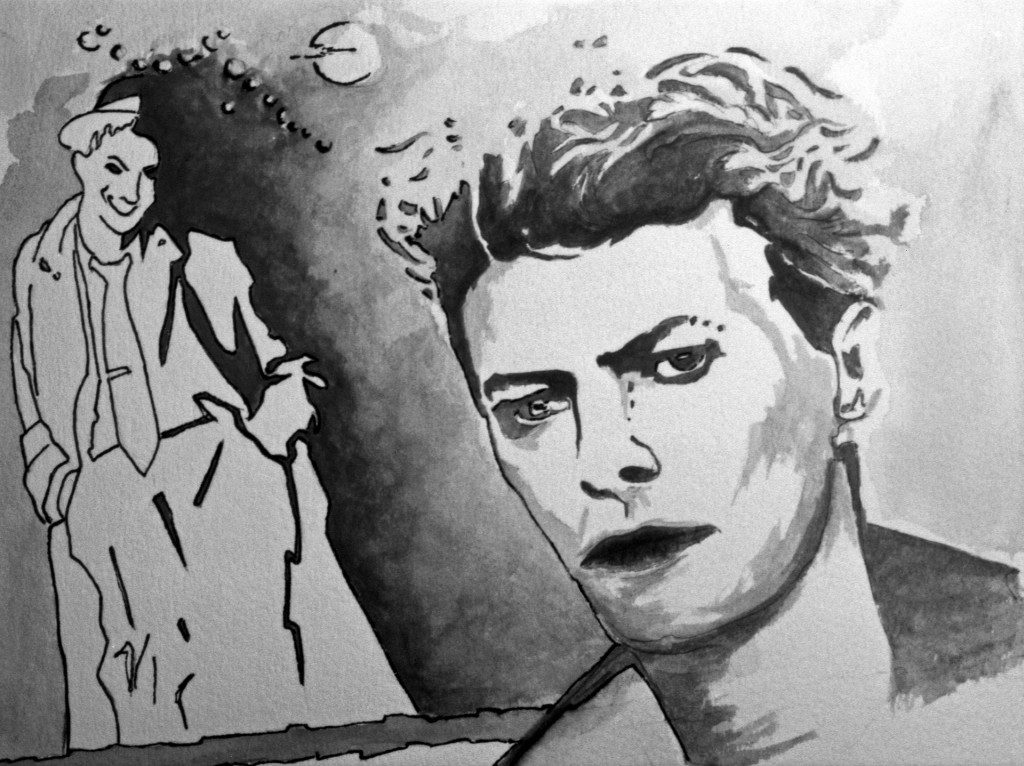Artur Rosman of Cosmos The In Lost published a post the other day calling the media out on hypocrisy for treating the sex scandals within the Church completely differently than David Bowie (and other stars’) sexual escapades with minors. Usually I find Rosman’s writing insightful and compelling, but in this case I think he makes a bad comparison.
Rosman’s article relies on suggesting a moral equivalency between Bowie’s sexual behaviour with “baby groupies” (fans in the 12-17 year old age group) and sexual abuse of minors by Catholic priests. In the one case, the media is notably silent and the behaviour gets a pass. In the other, it’s a huge scandal. Seems like a double standard, yeah?
Except that there are three important reasons why these situations are not equivalent.
First: Consent. In cases where a person’s ability to consent to sex is diminished, whether because of age, or intoxication, or mental incapacity, we naturally sense that there is a moral difference between someone giving superficial assent to another’s sexual advances, and a person deliberately seeking out or initiating sex. Generally, when adults have sex with teenagers we assume that the adult initiated because that’s the most likely scenario. We know that adults who have sex with teens often justify their actions by convincing themselves that the young person was “sending out signals” when in fact the victim had no intention to invite sex. We also know that teens often find it difficult or confusing to refuse an adult’s sexual advances and many victims report feeling trapped, pressured, manipulated or coerced in situations where they appeared to be consenting. For these reasons, we construe sex between adults and adolescents as rape.
But anyone who has been through highschool also knows that teenagers, including teenage girls, are perfectly capable of seeking out and initiating inappropriate sexual encounters. If a young girl spends all of her time fantasizing about rock stars, and she sinks large amounts of time and effort into actually getting to meet rock stars, and eventually one of these rocks stars has sex with her, she’s very unlikely to feel that she was raped or abused. Indeed, in the case that Rosman cites the woman (now an adult) relates the story of her sexual encounter with Bowie as a magical, fantastic experience – a fond memory, a dream come true.
This doesn’t mean that it’s okay for adult pop stars to take advantage of the foolish dreams of infatuated girls. It’s still inappropriate, predatory and criminal. But to call it rape (in a moral, rather than a statutory sense), and then compare it to a situation that is obviously rape in both senses, is to trivialize the real trauma experienced by the victims of sexual abuse.
Second: Hypocrisy. David Bowie never preached a sermon against sexual liberality. He never took vows of celibacy. He never claimed to represent an insitution that condemns all kids of sexual sin. If you judge you have to expect to be judged by the same standard that you apply to others. When a screwed-up human being, who frequently sings about being weird, screwed-up, high or deranged, turns out to be…well, exactly what they always claimed to be, few people are going to be shocked or angry.
On the other hand, when a hierarchical organization very publicly proclaims an extremely high standard of sexual conduct – one sufficiently rigorous that practically nobody lives up to it – and then we discover that the same organization has been deliberately covering up sexual depravities of a kind that almost nobody commits, we react differently. This is right and just. Indeed, if we ever reach the point where we really no longer expect a higher standard of moral conduct from Catholic priests than from pop celebrities it will mean that we have truly lost confidence in the moral authority of the Church.
Third: Spiritual incest. A priest does not have the same relationship with a young parishioner as a rock star. Priests exercise authority, they are (or at least were) frequently trusted to act in loco parentis, and within the liturgical life of the Church they represent Christ. For a priest to sexually abuse a minor is not merely inappropriate, it is blasphemous. The mainstream media may explicitly disbelieve this, but I think that every human being who has ever been Christian, or ever had any respect for Christian institutions, feels on a gut level that clerical sexual abuse is a sacrilege. The particular outrage that gets poured out specifically on Catholic priests and bishops who are responsible for the sex abuse scandals is actually motivated by a deep, inarticulate desire for the Church to be what it claims to be. It is a cry of disappointment and rage from a child betrayed by her Fathers.
Our relative indifference to the sins of pop stars, on the other hand, bears testimony to the fact that no matter how much we idolize them we know, deep in our hearts, that they are only human and can never take the place of God.
Image courtesy of Pixabay.













